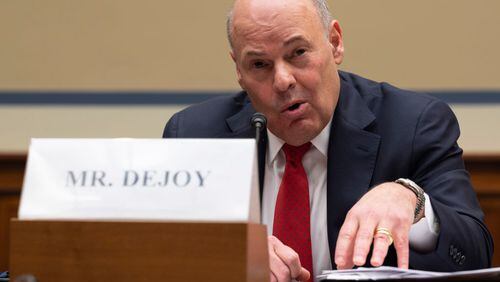DeKalb County took federal money meant for hiring unemployed or underpaid workers and instead spent it on the salaries of newly recruited firefighters who already had jobs, according to a report from the county’s ethics officer.
Diverting $150,000 in federal money from the U.S. Department of Labor's on-the-job training initiative to supplement the salaries of 34 firefighters in 2014 likely was a violation of the rules that govern the program, said the report by DeKalb Ethics Officer Stacey Kalberman, obtained by The Atlanta Journal-Constitution through Georgia's Open Records Act.
The funding was intended to offset the cost of on-the-job training. But DeKalb spent it on candidates who had previously applied to the fire department, some of whom were working as firefighters in other counties, Kalberman said. In addition, money for the positions had already been allocated in the county budget. The federal money allowed the county to save money it would have otherwise spent.
“That’s not how the program was meant to be run,” Kalberman said in an interview. “It was meant to serve a group of people who had a lack of skills.”
The director of DeKalb’s employment program denied wrongdoing, saying she has a “difference of opinion” over how to interpret federal rules on hiring for on-the-job training.
"The allegations of violations of the OJT guidelines are patently false," wrote Sheryl Stone, director for WorkSource DeKalb, in a response to Kalberman's findings. "WorkSource DeKalb's OJT program is implemented in compliance with federal, state and local policies."
Kalberman sent her findings to the U.S. Department of Labor’s Office of Inspector General last year and hasn’t been contacted by federal officials since then. It’s unknown if the federal government is investigating how DeKalb spent the money, or if authorities will try to make the county pay it back. The OIG hasn’t published information about the case on its website and didn’t return phone messages seeking comment.
In a similar case, the city of Atlanta agreed to pay more than $1.8 million as part of a settlement last year for alleged fraud in its jobs program. The city was accused of subsidizing the wages of employees who weren't eligible for the on-the-job training initiative, among other allegations.
In DeKalb, Stone says, 31 of the 34 firefighters checked a box on county forms saying they were unemployed just before their start dates in September 2014. The other three were found to be either unemployed or underemployed, she wrote in an undated response to Kalberman’s investigation.
However, their job applications tell a different story. Almost all of the applications, which were included in Kalberman’s report, showed the candidates were currently employed at fire departments, hospitals, fitness centers, local governments and private businesses.
Kalberman said the firefighters might have stated they were unemployed because they had left their prior jobs after being told they’d be hired in DeKalb.
“The only reason they were unemployed is they had to quit their other jobs to become DeKalb County employees,” Kalberman said. “Of course they were unemployed, because they had to give notice to their other jobs.”
DeKalb officials responded that annual audits show the county hasn’t misused funding for on-the-job training.
“The report did not provide conclusive information regarding the 2014 OJT program, and the inquiry was referred to the U.S. Department of Labor,” said a statement from county spokesman Andrew Cauthen. “The interpretation of the program’s guidelines in the report differs from WorkSource DeKalb’s interpretation.”
A review by the county’s internal audit unit resulted in “no definitive findings,” the statement said. The county held a series of meetings with staff and management to ensure proper record-keeping and compliance.
In all, DeKalb has received $350,632 since 2013 through the federal government’s employment initiative, which pays half of salaries of eligible employees for 90 days, according to Kalberman’s report. The total includes the $150,000 used for the Fire Department hiring, along with funding for new employees in other county departments.
Kalberman investigated the case in response to a complaint submitted through DeKalb's ethics hotline.
The U.S. Department of Labor allows employed workers to participate in its on-the-job training initiative in specific circumstances, according to federal regulations. Employed workers qualify when they're not earning a sufficient wage, or when the training is related to the introduction of new technologies or jobs that require additional skills.
A document attached to Stone’s response to Kalberman’s report listed all 34 firefighters as “skills upgrade needed,” even when they had previously worked for other fire departments in Georgia.
About the Author








